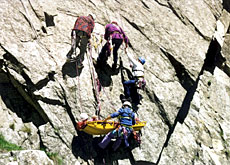
Mountain rescuers seek cash lifeline

The Swiss Alpine Club (SAC) says its mountain rescue division faces bankruptcy if it cannot find a way of generating urgently needed cash.
SAC officials are appealing to the federal government and the cantons to come to the rescue if a century-old tradition is to be saved from financial collapse.
The SAC has saved thousands of lives since it established a nationwide emergency service for climbers in 1901.
Last year was the busiest in recent memory for the club’s team of rescuers.
In 2003, there were 125 deaths in the Alps, the highest number since 1992. SOS calls from stranded climbers increased by 120 per cent, while accidents relating to rock and ice avalanches rose by 96 per cent.
SOS
But the SAC’s Hans Jaggi told swissinfo that the emergency rescue division was now badly in need of rescue itself.
“We only have an average budget of SFr750 ($590) per incident, down from SFr2,000 in 2000,” he said.
The mountain rescue division had accumulated SFr100,000 in debt by the end of 2003 and Jaggi estimates that this will rise to SFr300,000 by December this year.
“In a couple of years we will be bankrupt, so the SAC really has to think about whether to continue with rescue operations, or whether to leave it to somebody else – the problem is that there is nobody else.”
Plea for cash
The SAC relies on membership fees as well as the financial support of individual Swiss cantons. The federal government does not directly subsidise mountain rescue operations.
Jaggi said the SAC could be forced to cease rescue activities if no more money is forthcoming.
“Alpine rescue and the security of people is a duty of the government, and the cantons should contribute more money. The problem is that there is no money around and taxpayers don’t want to pay any more,” he said.
Proposals are already on the table to reduce costs by cutting staff and scaling back training programmes for rescuers.
Minimum service
But Jaggi says further cost-cutting will be difficult, since the service provided has already been reduced to the “bare minimum”.
“To make any more cutbacks would mean, for example, getting rid of rescue dogs or cutting back on equipment… but this would be a very bad option.”
One problem the SAC faces is that an increasing number of inexperienced climbers are taking to the mountains without the right equipment – and without the necessary insurance.
But the SAC is adamant that it is not and never will be in the business of rescuing only those who can afford to pay for their services.
“We don’t want to go down the way the United States has gone and ask stranded mountaineers for their credit cards before we rescue them,” said Jaggi.
swissinfo, Ramsey Zarifeh and Kathleen Aeschlimann
The Swiss Alpine Club (SAC) celebrated the 100th anniversary of its emergency rescue service in 2001.
It has a team of 3,000 rescuers at its disposal.
More than 500 rescue operations were carried out in 2003.
Only ten per cent of those rescued last year were SAC members.

In compliance with the JTI standards
More: SWI swissinfo.ch certified by the Journalism Trust Initiative





























You can find an overview of ongoing debates with our journalists here . Please join us!
If you want to start a conversation about a topic raised in this article or want to report factual errors, email us at english@swissinfo.ch.